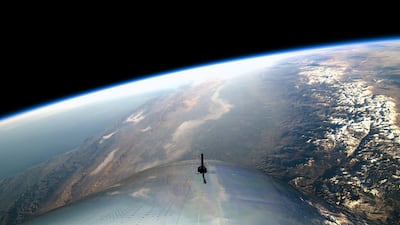Microgravity could pose significant health risks for some older space tourists, placing a dangerous strain on those with weak hearts, scientists have warned.
Astronauts typically undergo intensive physical training before missions, but the advent of space tourism means those travelling above Earth’s atmosphere are often older and less physically fit than before.
Microgravity is known to be demanding on the body, leading to the redistribution of bodily fluids that causes “puffy face bird leg” syndrome – with a swollen, puffy face and skinny legs – and changes to the cardiovascular system.
Scientists wanted to know how that could impact older people, who tend to have a higher proportion of heart problems.
“Heart failure alone affects over 100 million people globally. Traditionally, space medicine has focused on the effects of microgravity on healthy astronauts,” wrote Dr Lex van Loon, an assistant professor at the Australian National University and the University of Twente in the Netherlands, co-author of a paper published on Frontiers website.
“However, the inclusion of non-professional astronauts with pre-existing health conditions demands a deeper understanding of how microgravity impacts these individuals.”
Dr van Loon and his colleagues used models to simulate space conditions to see how they may fare in space.
The results were concerning.

“Our simulations revealed that entry into microgravity increases cardiac output in all individuals. However, for heart failure patients, this increase in cardiac output is accompanied by a dangerous rise in left atrial pressure, which can lead to pulmonary edema – a condition where fluid accumulates in the lungs, making it difficult to breathe,” wrote the researchers.
Future of space tourism
Space tourism is becoming increasingly more popular.
This month, Virgin Galactic launched six people to suborbital space, including three paying space tourists at reportedly $450,000 for a seat.
It was the final flight of the VSS Unity space plane before Virgin Galactic develops its next-generation Delta spaceships. The company is hoping these will allow it to operate more frequent flights at higher revenue.
Dr van Loon said his study findings highlight the importance of further research into the long-term effects of space travel on cardiovascular health.
One promising avenue for future research and safety in space travel, he said, is the development of human digital twins – a highly detailed virtual model of an individual's physiological systems.
“By creating these digital replicas, we can simulate various scenarios and predict how different conditions, such as microgravity, might affect an individual's health. This approach allows for personalised risk assessments and tailored countermeasures,” said Dr van Loon.
Virgin Galactic launches second commercial space flight – in pictures
That would help simulate how various different heart conditions would respond to the stresses of space travel.
“The dream of space travel is closer than ever, but with it comes the responsibility to understand and mitigate the health risks associated with this new frontier,” he said.
“Our computational modelling provides a critical step toward ensuring that space travel is safe for everyone, including those with heart failure.
“As we continue to push the boundaries of exploration, integrating advanced technologies like human digital twins will be crucial in protecting the health and well-being of all who venture into the final frontier.”
Microgravity is also known to affect the immune system, putting astronauts at risk of infections and skin conditions.
Recent research has discovered why this occurs, with “huge implications” for our understanding of ageing, because the changes seen to cells in space are also observed as we get older.
The work helped researchers build a picture of how immune system cells like lymphocytes and monocytes are changed by reduced gravity.
They discovered that the process alters the cells’ function at the single cell level – changes which are also observed during the normal ageing process.
Researchers also found a plant pigment called quercetin reversed approximately 70 per cent of the changes caused by lack of gravity.











